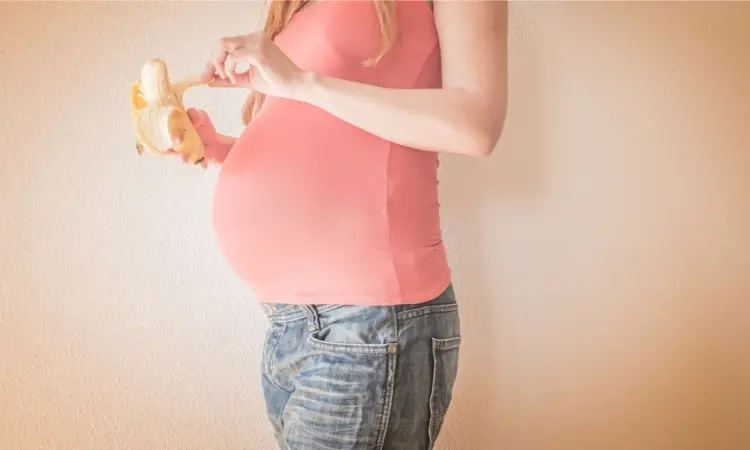Feeling nauseous during pregnancy is quite common. In fact, according to the source, 80% of pregnant women experience morning sickness that is characterized by nausea and vomiting. More often nausea during pregnancy hits right after the meal. Find out how to avoid vomiting after eating during pregnancy.
During pregnancy, especially in the first few months, expectant women feel like they want to vomit after eating. They may not vomit all of the time, but the intense vomiting sensation is just as unpleasant as vomiting itself.
Although it may sound simple, experienced people can tell you how difficult it is to handle vomiting during pregnancy. Some women get nausea after every meal, while others only get nauseous once in a while.

Pregnant women may experience nausea and hunger at the same time. They may also suffer a decrease in appetite after vomiting. They may also vomit a lot as if emptying their stomach, while many women gag a lot but only vomit a little.
Vomiting After Eating During Pregnancy – Concerns
Usually, vomiting after eating is not a cause for worry during pregnancy. However, if this occurs after every meal and lasts for an extended period of time, it is cause for concern.
Excessive vomiting during pregnancy in the first trimester may interfere with nutrient absorption. It can aggravate fatigue in pregnant women. It also raises the risk of slowing down fetal growth and low birth weight babies.
Furthermore, many pregnant women who vomit after eating lose a lot of weight. Just like excessive weight gain, excessive weight loss can also create complications during pregnancy.
Similarly, severe vomiting after eating during pregnancy raises the risk of dehydration. Dehydration at any stage of pregnancy can contribute to serious complications.
Calculate Due Date With LMP
What Causes Vomiting During Pregnancy?
The specific reason for nausea and vomiting during pregnancy is unknown. The reasons for vomiting during pregnancy will not be the same for all mothers. According to Dr Ankita Patel Tayal, our panel gynaecologist, “genetic, endocrine, and infectious factors can cause vomiting during pregnancy. It can also be an after-effect of sensitivity, stress, or tiredness.
Some of the causes of vomiting after eating during pregnancy include:
1. Changes in hormone levels
Studies have shown that rapid changes in hormone levels can lead to nausea and vomiting of pregnancy (NVP). Reproductive hormones such as estrogen, progesterone, and hCG (Human chorionic gonadotropin) can directly or indirectly affect NVP.
Fluctuations in hormone levels can cause changes in the contraction and relaxation patterns of the muscles in the stomach and intestines. This can trigger nausea and vomiting.
2. Heightened sense of smell
According to studies, most pregnant women experience a heightened sense of smell in the early months of pregnancy, which is also known as hyperosmia. It has also been discovered that the majority of pregnant women who have hyperosmia also experience increased nausea and vomiting.
According to the aforementioned study, 58 percent of 500 pregnant women said that it is strong smells that triggered their vomiting and nausea during pregnancy. As a result, a heightened sense of smell can be considered as one of the causes of vomiting after eating when pregnant.
3. Changes in the gut microbiome

It has been found that an increase in estrogen and progesterone levels during pregnancy affects gut function and microbiota composition. As a result, pregnant women are more susceptible to stomach infections.
Furthermore, when the balance of gut bacteria is altered, food remains in the small intestine for a longer span of time. All these factors can lead to discomfort in the stomach contributing to vomiting after eating during pregnancy.
Related Reading: 9 Common Infections During Pregnancy You Should Be Aware Of
4. Changes in the stomach muscle
During pregnancy, the abdominal muscles become slacker. Relaxin, a pregnancy hormone that relaxes the muscles, is to blame. The laxity of stomach muscles leads to a sluggish digestive system.
Eating greasy food further takes a toll on the digestive system, making it even slower. This can also contribute to vomiting after eating during pregnancy.
Pregnancy heartburn is another issue triggered by the relaxation of stomach muscles (precisely lower esophageal sphincter). It usually starts around the 7th to 8th week of pregnancy. This could also trigger vomiting after eating during pregnancy.
5. Slowing of the GI tract
The upper GI system may slow down during pregnancy. As this slowing down of the upper gastrointestinal tract increases, it can contribute to acute vomiting in pregnant women.
Several studies suggest that higher progesterone levels promote systemic muscular relaxation, which slows down the digestive tract’s peristaltic movements. As a result, stomach acids are eliminated slowly. Thus, stomach acids begin to accumulate. This can also bring about vomiting after eating during pregnancy.
Related Reading: Black Stool During Pregnancy- Probable Reasons, Remedies And Prevention
6. Psychological factors
According to certain research, psychological issues may also play a role in vomiting after eating during pregnancy. Anxiety, sadness, the stress of unwanted pregnancy, and even some family issues can also contribute to nausea and vomiting during pregnancy.
Is It Normal To Vomit After Eating During Pregnancy?
Vomiting is common during pregnancy. It is usually referred to as NVP (nausea and vomiting in pregnancy). While many women experience nausea when they are hungry, others may experience nausea immediately after eating.
If the vomiting is severe, it will be hard to keep any fluids or food down. When it is absolutely hard to eat or drink anything, then it is a matter of concern. This condition is known as hyperemesis gravidarum (HG), and it typically necessitates hospitalization and the administration of intravenous fluids and medicines.
Can Vomiting Cause Miscarriage?
Some pregnant women are concerned that vomiting will result in a miscarriage. This is usually due to the tension they feel in their abdomen during vomiting. Though there are a few causes of miscarriage but it’s a fallacy that vomiting can cause miscarriage since the movement of the stomach muscle has nothing to do with the baby’s safety.
We can’t, however, ignore some facts. When a pregnant woman vomits more frequently, her body loses more fluid, resulting in dehydration. When the body dehydrates, the liver generates ketones to provide energy to the body.
As the vomiting worsens, the body’s ketone levels rise dramatically. Ketones can be detected in the urine and blood. A high level of Ketones in a mother’s blood might be dangerous to the baby in the womb.
10 Simple Ways To Avoid Vomiting After Eating During Pregnancy

During pregnancy, every bite of food you take runs the risk of nausea and vomiting. However, implying some practices will help to avoid vomiting after eating during pregnancy.
Following are 10 ways to avoid vomiting after eating during pregnancy:
1. Practice fractionated meals
Instead of relying on a few larger meals throughout the day, eat small portions more often throughout the day so that you are never too hungry or too full. During pregnancy, both an empty stomach and an overloaded stomach cause nausea and worsen vomiting.
One way to reduce the likelihood of nausea is to reduce the load on the digestive tract. Eat whenever you are hungry, and always eat foods that appeal to you.
Related Reading: 22 Morning Sickness Snacks To Feel Better
2. Eat slowly
“Don’t eat too fast” is an age-old phrase that we can see repeated around us constantly. This is especially important when you are pregnant, and your stomach is sensitive. Eating quickly can be too much for it to handle, and can lead to vomiting. So, take your time with your food.
3. Try deep breathing
If your stomach feels uncomfortable or if you feel like you will throw up, try taking some deep breaths. This will make your abdomen expand a little, and your stomach will relax more as you exhale.
4. Maintain correct posture to avoid vomiting during pregnancy
Making sure your posture is proper can go a long way in ensuring a safe and comfortable pregnancy. So, after eating, make sure you are in an upright or semi-upright position for about half an hour after eating. Do not lie down immediately after a meal and if possible, walk, as walking has many benefits during pregnancy.
5. Avoid fatty and spicy food and food with strong odors
Greasy foods and foods that are very heavy will cause your digestion process to slow down greatly. This means they could leave you feeling uncomfortable and nauseated.
Likewise, foods with strong flavors, like spicy foods, may also cause trouble. Also ensure you stay away from foods that you know cause nausea, like foods that have a strong smell.
Staying away from these foods will save you a lot of problems and help you prevent vomiting.
6. Ginger/lemon may help with vomiting when pregnant
Ginger during pregnancy is known as a good thing to eat for proper digestion. Ginger tea, ginger ale, and other ginger foods are commonly used by expecting women to alleviate digestive issues such as vomiting.
However, never overdo it as ginger has heat-generating properties. Therefore, excess intake of ginger is not favorable for pregnancy, especially during the initial months. Lemon, too, has been known to provide relief from nausea.
7. Avoid drinking during meals
Regulate the fluid intake during pregnancy. You need to ensure that you drink a lot of water, but not too much. There are also specific times when you need to drink water, mealtime is not one of them.
Make a habit of drinking before and after meals, but not during. And when you do drink water, take it slow. Do not drink too much at once. This will help your food get digested more easily and reduce the urge to vomit.
Related Reading: 10 Drinks To Avoid During Pregnancy
8. Change prenatal vitamins
If the above steps do not seem to be working, let your doctor know. If you are taking prenatal vitamins, pay more attention to them. The iron in them has been known to cause nausea and vomiting in pregnant women. Changing brands may bring you the relief you need.
9. Go cold
Your sense of taste and your sense of smell are very interconnected, and hot food has a much stronger smell (and therefore, taste) than cold food. This smell and taste could be what is causing your vomiting.
If it is so, a good way to resolve the problem is to go cold. Eat the cold or cooled versions of your food. The weaker smell may reduce your vomiting and nausea.
10. Chew fennel seeds to avoid vomiting during pregnancy
Fennel seeds during pregnancy can help to alleviate nausea and vomiting. Chewing on them can help you too. If you are averse to this, you can make fennel tea instead. You can even add some honey to it to enhance the taste.
What To Eat After Vomiting During Pregnancy At Night?

Any bland foods, such as bananas, rusks, or toasts, are ideal to eat after vomiting at night during pregnancy. After vomiting, little by little reintroducing bland foods can help you keep food down.
Also, thoroughly rinsing the mouth after eating helps to reduce nausea. Brushing your teeth soon after vomiting is never a good idea because it triggers a gag reflex in some people.
Related Reading: 21 Pregnancy Superfoods To Include In Your Pregnancy Diet
Going to bed on an empty stomach (after vomiting) aggravates the vomiting sensation. After vomiting, sip ginger tea or suck a small piece of crystallized ginger to help relieve the sensation.
Conclusion
Most women experience relief from vomiting after eating anywhere around the end of the first trimester, between weeks 12 and 14 of pregnancy. Vomiting is normal during pregnancy and may not have an effect on your baby. It may also have no long-term consequences for you. It is only temporary, but the sensation can be frustrating. Taking the steps outlined above will assist you in dealing with this problem.
